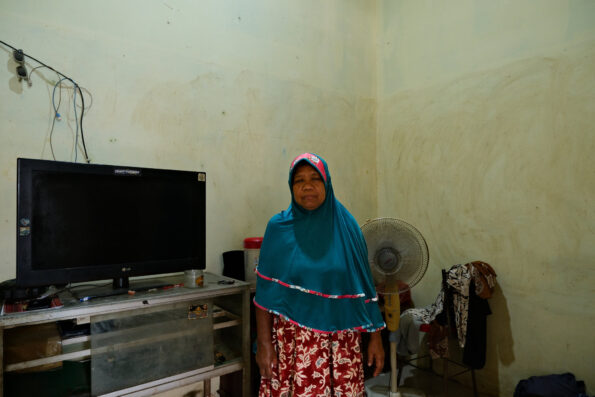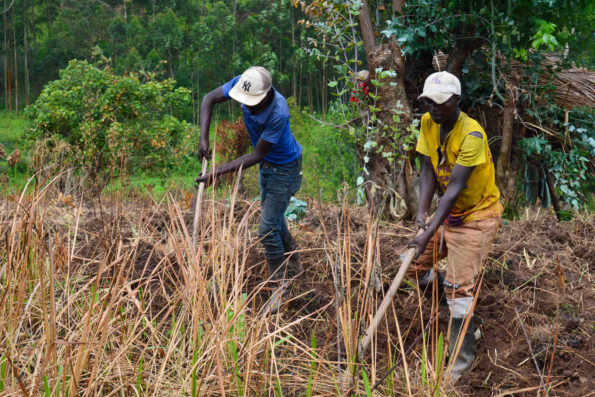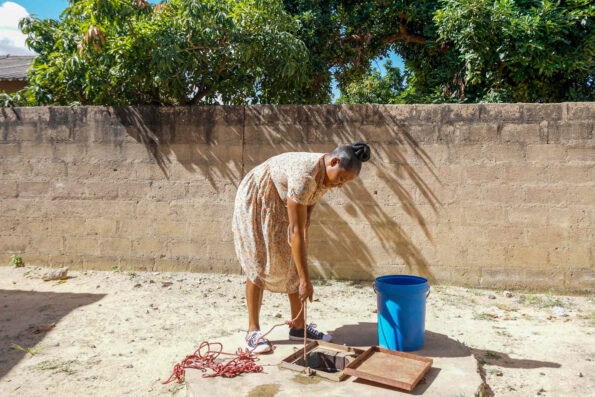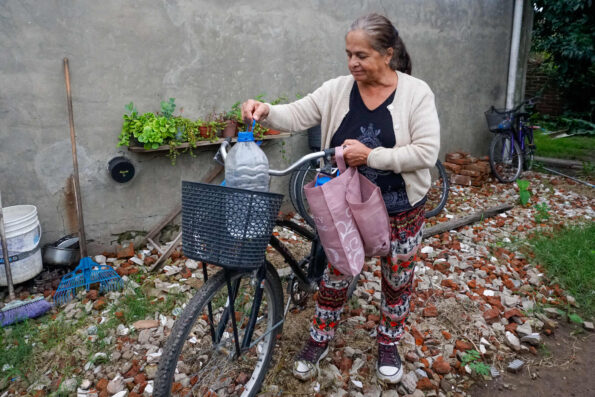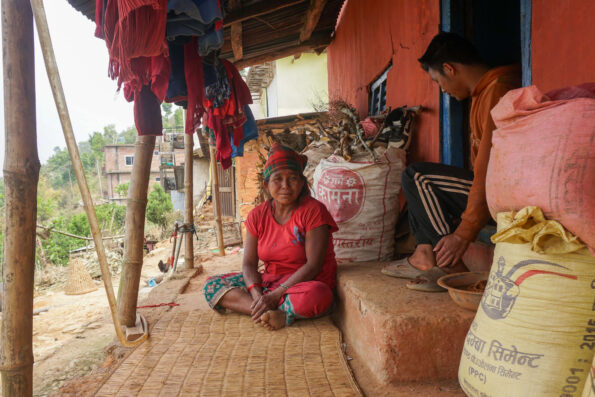
Kumala Wijeratne, GPJ Sri Lanka
Sri Lanka Customs officers of the BCNP Unit at the customs container yard show a load of rosewood valued at $7 million. The load was seized by customs officials in March 2014.
COLOMBO, SRI LANKA — In March 2014, a special unit of Sri Lanka Customs nabbed 28 containers of illegally sourced rosewood from East Africa on a ship that made a stop at Colombo port.
Officials say the 420 metric tons of rosewood turned out to be the largest haul of illegal rosewood seized anywhere in the world. Rosewood is a plant protected under CITES, the Convention on International Trade in Endangered Species of Wild Fauna and Flora, an international agreement among 181 countries to make sure the survival of wild animals and plants is not threatened by international trade.
Officials at the Biodiversity, Cultural and National Heritage Protection Branch of Sri Lanka Customs, or BCNP as it is commonly known, had been tracking the shipment for weeks following a tip they received. The containers yielded 3,669 logs of rosewood, valued at more than $7 million.
For BCNP officials, this was all in a day’s work, says Samantha Gunasekara, the former deputy director of Customs and head of the BCNP at the time of the rosewood seizure. He retired in April after 37 years of service but continues to be associated with the unit as a consultant.
Gunasekara says the BCNP’s primary focus is to prevent the illegal smuggling of plants, animals and artifacts from Sri Lanka, which is recognized as one of the world’s hotspots of biodiversity and has a wide variety of rare and endangered plants and animals.
The country’s location, on a major maritime route connecting Asia with Africa and Europe, has also made it a hub for transshipment – shipment to an intermediate destination on the way to a final point – of smuggled animals and plants.
The BCNP, as part of Sri Lanka Customs, has been working for more than two decades to reduce and eventually stop the smuggling of biodiverse items from the country. Tips from local villagers and shipping personnel trained to spot signs of smuggling have resulted in many large-scale shipments of smuggled goods being caught in time.
Gunasekara is the creator of the BCNP, having set up its predecessor, the Biodiversity Protection Unit, in 1993. It is recognized as the world’s first unit focused on the prevention of smuggling of biodiversity formed under a country’s customs department.
A wildlife enthusiast and keen orchid grower, Gunasekara says he realized that there was an urgent need to combat the smuggling of Sri Lanka’s rich biodiversity.
“Much of our endemic species were endangered since 1981, and smuggling activities increased, threatening vast resources in biodiversity,” he says. “The need for a mechanism to protect our national resources was of paramount interest.”
Sri Lanka, together with the Western Ghats, in India, compose one of the 35 biodiversity hotspots in the world, according to Conservation International.
The region is also listed as one of the eight “hottest hotspots” of biodiversity in the world according to the International Union for Conservation of Nature, or IUCN.
“Sri Lanka is widely known for its rich heritage in medicinal plants and trees, rare species of exotic butterflies, insects, fish, marine resources and wildlife,” Gunasekara says.
The BCNP has been empowered to take legal action through several Sri Lankan laws, says Mailvaganam Paskaran, director of customs, social protection directorate, of which BCNP is a part.
He says Sri Lanka’s Customs Ordinance, Fauna and Flora Protection Ordinance, Forest Ordinance, and the Fisheries and Aquatic Resources Act empower the unit, and they work in close collaboration with government agencies and nongovernmental organizations working on conservation.
As a part of Sri Lanka Customs, the BCNP operates at all customs inspection points, including the country’s ports, international airports and international mailing and courier operation centers, Paskaran says.
Gunasekara was among the recipients of the Presidential Environmental Award in 2004 for his work in combating the smuggling of Sri Lanka’s biodiversity. The BCNP has also won many awards and citations for its work.
Shamen Vidanage is the program coordinator at IUCN in Sri Lanka and has observed the effectiveness of the BCNP in protecting Sri Lanka’s biodiversity.
“The BCNP has been a driving force in detecting smuggling of biodiversity and is recognized for its contribution in protecting the illegal export and import of such rare commodities of value,” he says.
Among these rare items are leopard skins, conch shells, edible birds’ nests (swifts’ nests), shark fins, tarantulas, various amphibian species and dried or live parts of indigenous plants, Vidanage says.
Vidanage believes it’s important for Sri Lanka to have a unit such as the BCNP to serve as a symbol for the protection of these illegal exports, transshipments and imports.
Paskaran says that as of Sept. 1, the BCNP had made 27 seizures of illegal biodiversity smuggling this year. Among the goods seized were live animals such as tortoises and dead animals such as sea horses. Live plants, sandalwood logs and live fish were some of the other seized items.
“Smugglers always find new methods to avoid detection,” Paskaran says. “The most common is hand luggage with false bottoms, which in many instances carry species of rare insects, tortoise, turtles and rare orchids.”
Gunasekara says the majority of the plants and animals are smuggled to China, Japan, Hong Kong, India, Malaysia and Singapore.
Of the most widely smuggled items, seahorse and musk are mostly used as aphrodisiacs; shark fins and bird nests for succulent dishes; and herbs for medicinal purposes and the manufacture of perfumes, Gunasekara says. The live tortoises and fish are smuggled to be reared as pets.
Sometimes, local people and even customs officers are not aware of the value of a smuggled plant or animal, Paskaran says.
A few years ago, officers of the BCNP noticed that pieces of wood from a local tree named Walla patta, or Gyrinops Walla, were being regularly smuggled out, Paskaran says. They investigated and found that this wood was highly prized in western countries for the manufacture of perfume as it produces agarwood resin and was being smuggled out by a small group of people who understood its value.
“Our farmers are ignorant of the economic value of such species,” Paskaran says. “Even our ancestors would have used them for firewood.”
Gunasekara says the BCNP works to raise awareness among communities in areas where endemic plants and animals are found.
Seminars and lectures are held with local government officers, schoolchildren, village communities and leaders in villages bordering rainforests and wetland areas. This helps to strengthen detection and prevention of smuggling at the source, Gunasekara says.
Many BCNP detections occur as a result of tips, and awareness among local communities as well as training of those in the export field and related services has increased the number of such tips received, he says.
The small staff of the BCNP is supplemented with a task force of 100 customs officers from other units of Sri Lanka Customs who volunteer their services to work with the BCNP, Paskaran says.
Gunasekara trains them in the detection of various endemic species and takes them on field visits to see plants in their natural habitat. Since they receive a very small allowance for the work they do with the BCNP, only the most dedicated customs officers form the task force, Gunasekara says.
“Those who have a passion for biodiversity and are keen in protecting it remain with the task force and are trained for the job,” Gunasekara says.
Gunasekara says anonymous tips, a wide network of informants and the active, vigilant task force of the BCNP have combined to increase the surveillance of smuggling, which has resulted in numerous detections and seizures of large shipments.
These detections are vital to protect Sri Lanka’s biodiversity from gene piracy as well, Gunasekara says. Gene piracy, also known as biopiracy, is the commercial exploitation of biological materials native to a country without fairly compensating the people or government of the country.
“Gene piracy creates a dangerous trend that can annihilate the origin of our resources and simultaneously create harmful invasive byproducts in the world,” he says.
He cites the patenting in Japan of medicines and extracts of Kothala Himbutu, or Salacia reticulata, a species of plant endemic to Sri Lanka that is believed to be effective in the treatment of diabetes.
The plant is protected, and its sale and export are illegal in Sri Lanka, but it is one of the most popular plants to be smuggled out of Sri Lanka, Gunasekara says.
In September, Sri Lanka Customs’ Preventive Division seized a container of 8,000 kilograms (17,600 pounds) of Kothala Himbutu that was being exported to Japan via Malaysia, under the guise of being a cinnamon-chip consignment, Gunasekara says. The consignment was valued at around 4.2 million rupees ($29,919).
Vidanage says surveillance of ports of entry in Sri Lanka needs to be further strengthened to discourage smuggling and that more needs to be done to involve local communities in the battle against smuggling.
“Enforcement by wildlife authorities and empowerment of local communities in the conservation of biodiversity and heritage and other stakeholders are vital,” he says. “A natural love to safeguard the country’s resources should be created through educational programs.”
But Paskaran says the presence of the BCNP has already created awareness among the communities and discouraged those involved in smuggling operations as the monitoring systems are better placed.
“Controls placed in strategic points such as the Colombo port, Trincomalee port, entry points such as airports, courier services and mails, border coast guards, naval interception of smugglers all contribute in the operation to detect trafficking of biodiversity,” he says.
But Paskaran admits that with 1,200 containers to be cleared by Sri Lanka Customs every day at the Colombo port alone, there can be lapses and some smuggled goods can slip through.
Gunasekara is optimistic that the BCNP is gaining an upper hand against the smugglers, even though there is still much to do.
The branch has recently acquired new equipment, updated databases and developed a new networking system with expert botanists and zoologists who provide the BCNP with feedback on the species they find being smuggled, he says.
Even though he has retired from Sri Lanka Customs, Gunasekara is determined to impart his sense of purpose to those who follow in his footsteps.
“BCNP is important,” he says emphatically. “Apart from deforestation, trafficking of biodiversity is the major threat to the country’s fauna and flora.”







